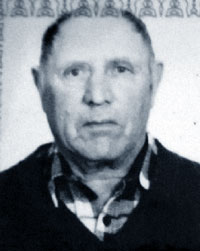









 Born on 1st of August 1933 in the hamlet of Karamyshevka, Krasnoarmeisk
District, Saratov Region. Father: Jakob Christianovich Jegel, mother: Anna-Maria
Andreevna. In the family there were nine children: Christian, Andrei, Frieda,
Volodya, Yascha, Platon. Two died in Saratov Region - Sonja and her brother.
Born on 1st of August 1933 in the hamlet of Karamyshevka, Krasnoarmeisk
District, Saratov Region. Father: Jakob Christianovich Jegel, mother: Anna-Maria
Andreevna. In the family there were nine children: Christian, Andrei, Frieda,
Volodya, Yascha, Platon. Two died in Saratov Region - Sonja and her brother.
In August 1941 they were exposed to repressions. I was 8 years old at that time. In the autumn our family was deported to Krasnoyarsk Territory. We went on the river Volga by barge, afterwards we had to board a train. They took us to Krasnoyarsk in freight wagons. The trip took a whole month. They often kept our train standing on holding tracks. When we left our home, they promised us (and even reached out a document) that, having arrived in place, they would provide us with everything we mostly needed, among others – living space and cattle. We left almost all our belongings, just taking along some clothes. The passengers received meals during the trip. At the train stations father got out of the train to fetch a pale with hot food, which he then used to share among the people. Only too well that it was not yet chilly outside; hence, we were not cold.
In September 1941 we already lived in the village of Kirilovka, Ilansk District. They had taken us to the village from Ilansk by horses. We were temporarily quartered in a disused house. In the autumn father worked for the kolkhoz farm, helping with the harvest, and in January they sent him and his two sons Jakob and Christian to serve for the labor army. Father and Christian got to Cheremshanka, Jakob to Middle Asia.
There were many people in Cheremshanka and there was a lot of work to do, as well – they were sawing wood. The mortality rate was high. According to father’s memoirs they made a big excavation by the aid of a tractor. Then they threw the troops into it, but obviously some of them were still alive – they were quivering, gave winces of pain. Nonetheless, they were buried alive, together with the dead corpses. Due to the circumstance that father was working as a stable hand, both father and son did not starve to death. Sometimes mother and I went to see my father. There was a hanging bridge over the river Poima, which led directly to Cheremshanka. We had to wait there for a while, until the guard had fallen asleep. And then we quickly stole ourselves on to the territory. Later he asked us, how we had managed to do that. It was not allowed to leave Cheremshanka, there were watchmen all over the place.
Dead was restored to freedom in 1953. I have been working for the kolkhoz farm all my life - 37 years. I never received any vocational training. As of 1953 I had a job as a tractor driver. In Yuzhno-Aleksandrovka I listened to some lectures about professional tractor handling. In 1981 I removed from the village of Kirilovka to Novonikolayevka. I sent requests for information to my home town in Saratov Region. However, they replied that my family had taken along all their belongings when they removed, and that no further information was available about their deportation. My two brothers, Jakob and Christian stayed in Middle Asia; later, in the 1990s they left to Germany with their children. They came to visit us and also invited us to come to Germany, but we decided against. There were so many victims of repressions: the Moor, Gorras, Kaupt, Meisner families. The Germans lived in Prokopyevkа, Yuzhno-Aleksandrovka. But what ist he use of remembering all this nowadays? Does this change past live?
Recorded by T.A. Mileschko